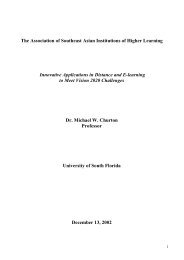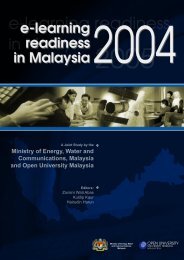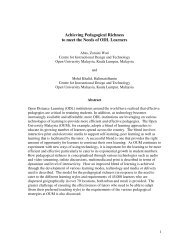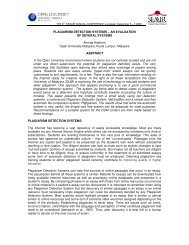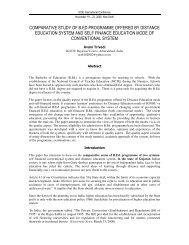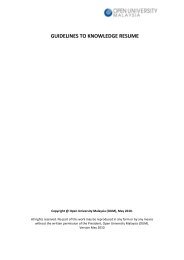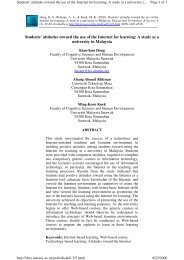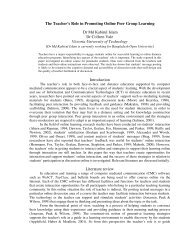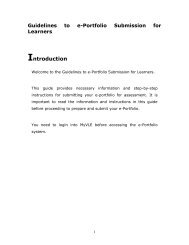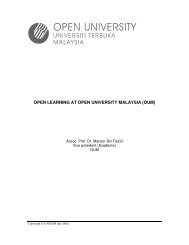lifelong learning and distance higher education - Asia Pacific Region
lifelong learning and distance higher education - Asia Pacific Region
lifelong learning and distance higher education - Asia Pacific Region
- No tags were found...
You also want an ePaper? Increase the reach of your titles
YUMPU automatically turns print PDFs into web optimized ePapers that Google loves.
the current capacity of the <strong>education</strong> <strong>and</strong> training market, public <strong>and</strong> private, probablyneeds to be at least doubled in most knowledge-based economies (Open LearningAgency, 1992).Online <strong>learning</strong> <strong>and</strong> knowledge-based economiesIn knowledge-based economies, there is a need for skills such as seeking, analyzing<strong>and</strong> applying information, independent <strong>and</strong> <strong>lifelong</strong> <strong>learning</strong>, problem-solving, creativethinking <strong>and</strong> teamwork. The <strong>education</strong> of knowledge-based workers requires an approachthat enables them to learn both inside <strong>and</strong> outside conventional <strong>higher</strong> <strong>education</strong>institutions. Such learners must be encouraged to analyze <strong>and</strong> criticise, to offer alternativesolutions <strong>and</strong> approaches <strong>and</strong> to take risks. This kind of <strong>learning</strong> cannot be easily donein large lecture classes or through mass communications such as broadcasting (see Bates<strong>and</strong> Poole, 2003, for more discussion of this issue).Governments see two quite distinct roles for online <strong>learning</strong> (or e-<strong>learning</strong>), deliveredthrough the Internet. They see online <strong>learning</strong> as a new knowledge-based industry, ableto lever the advantage of advanced <strong>education</strong>al systems to create <strong>education</strong>al products<strong>and</strong> services that can be marketed internationally <strong>and</strong> indeed, many new companies havebeen created to provide online <strong>learning</strong> for both the corporate <strong>and</strong> to a lesser extent, thepublic sector. Governments also see online <strong>learning</strong> as an important tool for improvingthe quality of <strong>education</strong> <strong>and</strong> for producing technology-savvy graduates, able to use newtechnologies in the new economy.Business also sees a value in online <strong>learning</strong> as a way of increasing competitivenessthrough ensuring that the workforce is continually <strong>learning</strong> <strong>and</strong> improving.In particular, online <strong>learning</strong> is seen as an essential component of knowledgemanagement, allowing companies to become “<strong>learning</strong> organisations” (see Senge,1990, <strong>and</strong> Rosenberg, 2001). Because training is costly, efforts are being made to findmore cost-effective ways to train. Consequently, in the last few years, online <strong>learning</strong>has been applied on a large scale in corporate training. Some major companies havedemonstrated substantial financial <strong>and</strong> operating benefits as a result of switching toonline training (Strother, 2002).Most importantly, individuals see <strong>distance</strong> <strong>learning</strong> providing the flexibility they need tocontinue their <strong>education</strong> or training while still working or with family responsibilities.The rapid growth of knowledge in areas such as health, technology <strong>and</strong> managementrequire people working in these areas to continue to study <strong>and</strong> learn, just to keep up withthe knowledge base of the job. Distance <strong>education</strong>, <strong>and</strong> in particular online <strong>learning</strong>, areideal methods for <strong>lifelong</strong> learners.Irrespective of the country, it is likely that agricultural, industrial <strong>and</strong> knowledge-basedeconomies will exist side by side, but the proportion of the workforce in each sector willvary. However, it should be noted that the skills required in knowledge-based industries<strong>and</strong> the teaching methods needed to develop them, may not be so relevant for industrialor agricultural economies. Thus teaching methods <strong>and</strong> the choice of technology will needto vary depending on the dominant economic sector for which workforce preparation <strong>and</strong>training is needed. The implication for less economically advanced countries is that print<strong>and</strong>broadcast-based open universities may be the priority for public funding, but someform of online <strong>learning</strong> will also be needed for professional elites, possibly privatelyfunded (Bates, 2001).137



